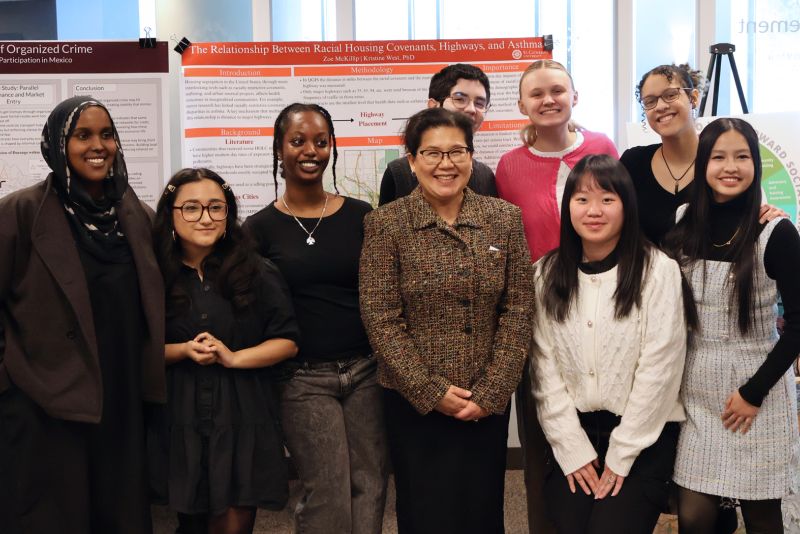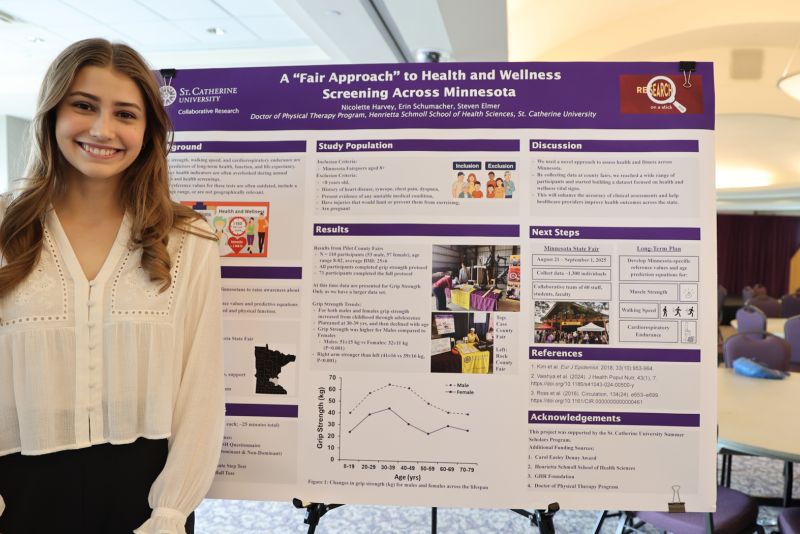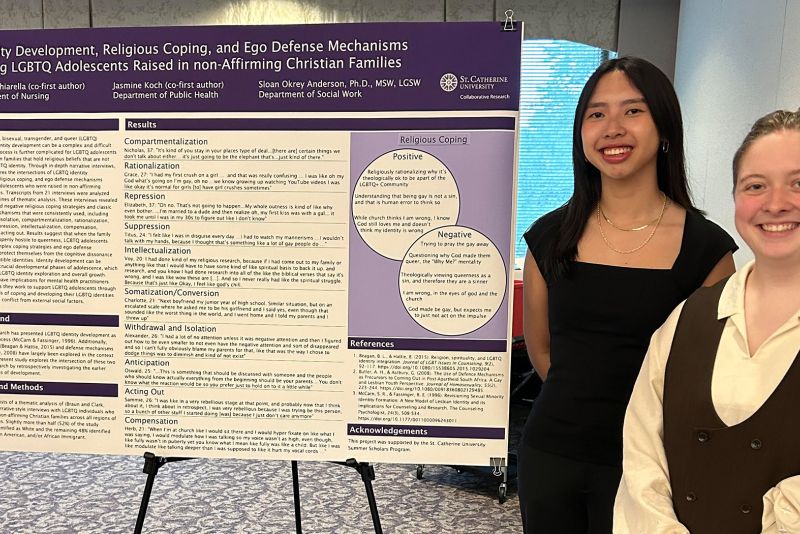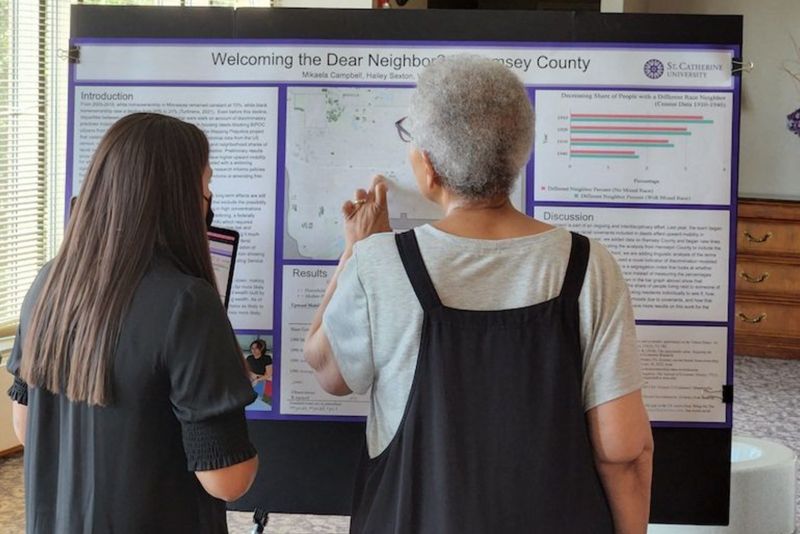Applications will be due in March 2026 for Summer Scholars 2026.
Summer Scholars 2026 will run from Wednesday, May 27 - Friday, July 31. We are currently planning to hold weekly student and mentor workshops on Wednesday and Thursday mornings.
Students and faculty complete online application together.
Download Timeline Template (Word)
Timeline Examples
The Summer Scholars program provides support for undergraduate students and faculty from all disciplines to engage in collaborative research and creative work while immersed in a culture of scholarship.
Our program has two primary objectives:
- Provide meaningful, rich experiences for students in which they make significant contributions to scholarship.
- Provide faculty with the resources and support they need to advance their program of research/scholarship.
About the Summer Scholars Program
Support for Scholarship
Summer Scholars supports faculty-student collaborations in all disciplines. Each team is typically comprised of one faculty member and one or two students. Compensation for faculty and students allows teams to focus on their scholarship during 10 weeks during the summer. Teams are also provided with training, support, and resources to facilitate the peer-reviewed dissemination of their scholarly work.
Community of Scholars
Summer Scholars establishes a supportive community of faculty and student scholars who learn from and support one another; this community of scholars is a critical part of the program. Students and faculty attend weekly workshops designed to support scholarship, professional, and personal development.
Student-faculty teams that include undergraduate students and ranked faculty members are eligible.
- Students and faculty must complete an application together. Summer Scholars teams are typically one faculty member and one or two students.
- All ranked faculty are eligible to apply. Adjunct faculty are not eligible for the program.
- Students must be enrolled in a bachelor's degree program and have at least one semester left at St. Kate’s after completing the program to be eligible.
Summer Scholars is an intensive 10-week immersive experience for both faculty and students and requires an investment in scholarship, mentoring, and group dialogue to create a strong cohort and culture of scholarship. Faculty must be available to fully engage in the scholarly project, to effectively mentor the student collaborator(s), and to actively participate in Summer Scholars workshops and activities. Any summer travel plans must be detailed in the application timeline. Note that although Summer Scholars is a 10-week intensive summer program, your commitment is for the entire academic year, as students and mentors are expected to prepare for and present their work at a national conference during the academic year.
Students also need to demonstrate a commitment to the program by describing how they will manage their other obligations and meet the expectations of this program. Any summer travel plans must be detailed in the application timeline. Students can apply to work 20 hours/week and must commit to submitting an abstract to the National Conference on Undergraduate Research or discipline-specific conference or its equivalent.
The Summer Scholars program is committed to promoting collaborative scholarship across disciplines while supporting both faculty and students. Faculty who fully engage in the Summer Scholars program will be paid a summer stipend equivalent to one course overload. Students will be paid to work 20 hours per week.
The dissemination requirements (see above) require students and faculty to continue working on their scholarship during the academic year. While we strive to provide funding for students, we cannot guarantee that students will be paid in the fall (though we guarantee funding for travel to NCUR if abstracts are accepted). Faculty are paid for their work in the summer only.
This year, we have the following additional funding opportunities available to support Summer Scholars projects:
- Muellerleile Endowed Fund—This fund will support three projects in the humanities.
- Taking Up Space 3M grant—This grant will support four Summer Scholars teams, who as part of their project will mentor high school STEM students in a summer camp, themed "Life on Mars." Teams desiring to participate in Taking Up Space should communicate with Dr. Tami McDonald.
- Seed Coalition Summer VISTA—Opportunities may be available for students to conduct full-time research in conjunction with the Summer Scholars program. This program supports projects related to education, economic opportunity, or health.
For more information about these opportunities, contact collresearch@stkate.edu
All students are expected to submit their work for presentation at a peer-reviewed venue (e.g., undergraduate or discipline-specific conference, gallery exhibit, performance) during academic year. Additionally, teams will be encouraged and supported in their efforts to publish their work in a peer-reviewed journal or the discipline equivalent. Students also are required to present their scholarship at either the St. Catherine University Fall Research Symposium or the Sr. Seraphim Gibbons Undergraduate Symposium.
Teams conducting research with human participants need approval from the Institutional Review Board prior to beginning their scholarship. Projects that require IRB approval will be contingently accepted for Summer Scholars support until they have been approved.
Participants evaluate the Summer Scholars program and its components.
Students and mentors are asked to promote the program and connect with the community by sharing your Summer Scholars work. Teams may be asked to present their work to prospective students, University community members, donors, potential donors, and alumnae or to discuss the Summer Scholars program with them.
All teams must submit a final report following their Summer Scholars experience.
Strategies Used in Minnesota for the Unwinding of Medicaid Post-Public Health Emergency: July 2023
Timothy Schulz BA, Julie Sabo PhD, RN APRN, CNS, FCNS
Building a Brighter World: A Young Person’s Guide to Public Health
Tara Harbo, Jade Lent, Meghan R. Mason, PhD, MPH
Understanding the effects of accessible medically-tailored food boxes containing fruit and vegetables on cardiometabolic markers in immigrant Hispanic/Latine individuals with hypertension
Angela Cuccio & Ambria Crusan
Stratospheric exposure studies of Brassica rapa (Wisconsin Fast Plants)
Kadiatu H. Kaya, Odunola Adewale, Abby Conrad, Bronwyn Hicks, Erick Agrimson
Pre-Eclipse Stratospheric Ballooning with Radiosonde
Odunola Adewale, Kadiatu Kaya, Bronwyn Hicks, Abby Conrad, Erick Agrimson
Investigating Food, Greenspace, and Mental Health Access in Covenanted and Non-Covenanted Communities
Salma Ali, Abbey Haveman, Dr. Elizabeth Allen
The Legacies of Neighborhood Segregation in St. Paul, Minnesota’s Independent School District 625
KC Meredyk, Eva Ngono, Rachel Neiwert
Editing CDKN1A and RASD1 in a Cell Culture System
Hope Vue and Dr. Kellie Agrimson
Optimizing in vitro Editing of SPP1 & NXF2
Regan Rockswold and Kellie Agrimson
Impacts of Marriage Equality on Time Use
Melody Kosbab, Mollie Pierson, Kristine West
Craftsmanship of Worth
Assistant Professor Carol Mager, Veronica Wakefield, Neve Paulbicki
Utilizing the Existing Literature on Psychosocial Vital Signs to Design an Interprofessional Training Program
Valerye Peterson, Stephanie de Sam Lazaro, OTD OTR/L, Madeline Youngman, OTS
The effect of sodium chloride (road salt) stress on floral nectar sugar concentrations and gene expression in Brassica rapa
Naturelle Vang, Ya Yei Xiong and Rahul Roy
Improving Balance in Women 50 and Older Through Immersive Virtual Reality Training:
Our Study at a Glance
Skylar Mattson, Juliette Kline, Marcie Myers, PhD
Narratives of Mental Health in Professional Male Athletes as Constructed by the Media
Juliette Kline, Rebecca Busanich, Ph.D.
Editing Genes Important for Spermatogenesis in a Cell Culture System.
Stephanie Nguyen ‘23 Biology, Longevity and Aging minor; Cassie Norbeck ‘24 Biology, Longevity and Aging minor
Faculty Mentor: Kellie Agrimson, Biology
Healthcare Experiences of Transgender and Gender Diverse Patients by Race and Location
Hannah Bladow, Psychology ‘23
Faculty Mentor: Alvin Akibar, Psychology
Distance learning and parental mental health during the COVID-19 pandemic: Evidence from the United States
Abigail Nachreiner ’24 Economics, Public Policy, Women and International Development; Isabel Honzay ’24 Economics and Public Policy, Accounting minor
Faculty Mentor: Lanlan (Lacey) Chu, Economics and Political Science
Understanding culturally-appropriate fruit and vegetable choices to increase DASH Diet compliance in Hispanic/Latinx individuals with hypertension
Kerrie Roozen ’23 Dietetics
Faculty Mentor: Ambria Crusan, Nutrition and Dietetics
Impact of far infrared technology on quality of life in older adults
Arianna Balingit ’24 Biology, Longevity and Aging minor; Shavonnye Rath ’24 Applied Exercise Sciences - Pre-DPT, Psychology minor
Faculty Mentor: Josh Guggenheimer, Exercise and Sport Science
Green Mechanochemical Synthesis of Photoluminescent Materials
Katharine Bendel ’24 Chemistry (ACS), French
Faculty Mentor: Daron Janzen, Chemistry and Biochemistry
Synthesis, Characterization, and Modeling of Hybrid Polyoxometalate Enzyme Inhibitors Samantha Erickson ’25 Biochemistry, Public Health
Faculty Mentor: Christopher Jordan, Chemistry
Welcoming the Dear Neighbor?: A Neighborhood Look
Sophie Gibson ‘25 History, Art History; Maya Isabel Villafuerte ‘24 History
Faculty Mentor: Rachel Neiwert, History
Barriers and Facilitators to Interdisciplinary Mental and Behavioral Health in Primary Care [GHR funded]
Isabella Norcross ’25 Psychology; Amy Wickenhauser ’23 Psychology, Longevity and Aging minor
Faculty Mentor: Kimberley Persons, Occupational Therapy
The prevalence of urinary incontinence in female collegiate athletes.
Whitney Wenner ’23 Exercise Science and Nutrition; Emma McAfee ’25 Public Health: Public Policy (Pre-OTD)
Faculty Mentor: Lana Prokop, Exercise and Sport Science
Determining the impact of phosphorylation rates on the dilated cardiomyopathy linked phospholamban mutants R9H and R9L [GHR Funded]
Naddi Jillo ’23 Biology, Chemistry minor; Eyerusalem Alene ’23 Biology
Faculty Mentor: Kim Ha, Chemistry and Biochemistry
Welcoming the Dear Neighbor? Economics team
Mikaela Campbell ’23 Public Policy, Economics; Hailey Sexton ’23 Financial Economics, Accounting
Faculty Mentor: Kristine West, Economics
Public Health Implications of Arts in Urban Ethiopia: A Qualitative Case Study
Iyat Al-jayashi ’26 Sonography
Faculty Mentor: Hui Wilcox, Sociology
Regener-Pfotzer Maxima Studies in Preparation for the 2023 and 2024 Solar Eclipses
Maddie Ross ’23 Physics, Biology minor
Faculty Mentor: Erick Agrimson, Physics
Insulin-Like Peptide 4 Annotation in Newly Sequenced Drosophila Species
Rebecca Benvie ‘23 Biology, Longevity and Aging minor
Faculty Mentor: Kellie Agrimson, Biology
Responding to a Changing World: Assessment of Water Quality using a Modern Method to Monitor Algae
Sydney Kennedy ’22 Biology and Public Policy
Faculty Mentor: Paula Furey, Biology
Critical Analysis: Barriers and Opportunities for Addressing Oral Health Equity Issues [GHR funded]
Juliette Kline ’24 Exercise and Sport Science, pre-OT, Aging and Longevity minor; Anchee Nitschke Durben ’24 Public Health – Health Sciences, Longevity and Aging minor
Faculty Mentor: Stephanie de Sam Lazaro, Occupational Therapy
Green Synthesis of Semi-sustainable Organic Photovoltaic Materials
Hannick Biermeier’23, Chemistry (ACS)
Faculty Mentor: Daron Janzen, Chemistry and Biochemistry
Public Space as Democracy’s Saving Grace: Farmer’s Markets and the Making of Good Neighbors
Hannah Olson ’23 Women and International Development, International Studies minor; Melody Kosbab ’24 Political Science, professional Writing and American Sign Language minors
Faculty Mentor: Nawojka Lesinski, Economics and Political Science
Regency Respite in Times of Chaos
Michelle Dolan ’22 Apparel Design
Faculty Mentor: Carol Mager, Apparel Merchandising and Design
Welcoming the Dear Neighbor?: A History of Housing Inequality in Ramsey County
Anastatia Rousseau ’22 History, Philosophy minor; Ava Griswold ’21 History and French, Women’s Studies minor
Faculty Mentor: Rachel Neiwert, History
Prenatal Telehealth - Product Testing and Evaluation of Outcomes
Mckenna Paluk ’22 Dietetics, Longevity and Aging minor
Faculty Mentor: Emily Nowak, Nursing
Alumnae Memorial Garden Sculpture
Carolina Lopez ’22 Visual Arts Teaching K-12; Sia von Weiss ’23 Philosophy and Studio Art
Faculty Mentor: Monica Rudquist, Art and Art History
Determinants for Choosing Processed Foods in Adult Populations [GHR Funded]
Kathryn Nelson ’23 Dietetics; Victoria Barkosky ’23 Dietetics
Faculty Mentor: Kathleen Thames, Nutrition and Dietetics
Upward Mobility in Ramsey County
Victoria Delgado-Palma ’23 Public Policy; Ava LaPlante ’23 Economics and International Studies; Calyn Schardt ’23 Economics, Public Policy and Women and International Development
Faculty Mentor: Kristine West, Economics
Neighborhood Change and Racial Diversity in the Suburban Twin Cities Metro Area
Angela Guerrero ’22 Psychology and Sociology
Faculty Mentor: Daniel Williams, Sociology
History
Welcoming the Dear Neighbor? A History of Housing Inequality in Ramsey County
Alexandra A S Keller ’21 International Studies, History minor; Vee Signorelli ’21 Theology
Rachel Neiwert, History
Biology
Writing an Education Primer for the Journal Genetics
Kylie Burkstrand Dec ’20 Biology
Andrea Kalis, Biology
Biochemistry and Chemistry
Synthesis of a Norbornene-Containing Substrate for the Enzyme Geranylgeranyltransferase
Haley Dammar ’21 Chemistry (ACS)
James Wollack, Chemistry
Green Synthesis of Solar Cell Materials
Hope Holte ’22 Chemistry; Badraa Al-jasim ’21, Chemistry and Biochemistry; Hil Ngouajio ’21, Chemistry and Biochemistry
Daron Janzen, Chemistry and Biochemistry
Addressing the Antibiotic Crisis: Drug Discovery in Microbes
Porhouy Minh ’21 Chemistry and Biochemistry, Math minor
Annalisa Jordan, Chemistry and Biochemistry
Physics
Measurements Recorded via Stratospheric Ballooning
Stratospheric Ballooning Investigation of the 2023 and 2024 Eclipses
Callie Korzeniowski ’23 Chemistry, Physics minor; Anisa Tapper ’23 Math, Physics minor
Erick Agrimson, Physics
Modeling Low-Energy Nuclear Quenching in Super CDMS Using Neutron Capture Data
Judy Panmany ’20 Chemistry
Hannah Rogers, Physics
Economics
Discrimination in the Twin Cities Rental Market
Karisa Johnson ‘22 Economics and Public Policy, Statistics minor
Marina Mileo Gorzig, Economics
Unintended Tradeoffs: Adolescent Sleep vs. Elementary Enrollment
Emma Kettle ’22 Economics and Public Policy; Olivia Matzke ’22
Economics Kristine West, Economics
Nutrition, Dietetics, and Exercise Sciences
Nutrition Assessment in St. Mary’s Health Clinic Serving Undocumented, Non-English Speaking, Latinx Patients
Katie Lilja ’21 Nutrition and Dietetics; Teal Walters Dec ’20 Nutrition and Dietetics
Ambria Crusan and Megan Baumler, Nutrition and Dietetics
The effect of gait training devices of gait range of motion in older adults after a six-week walking intervention Julia Clark ’21 Exercise Science pre-PT; Reilee Schepper ’22 Exercise Science pre-PT
Lana Prokop, Nutrition and Exercise Sciences
Psychology
Gender and Sustainability: An Empirical Investigation of Ecofeminism
Elyse Collyer ’21 Psychology
Gabrielle Filip Crawford, Psychology
Public Health
How Do Healthcare Providers Screen Children and Families for Housing Instability? A Literature Review
Grace Anne Ludvik ’22 Public Health, Spanish minor
Meghan Mason, Public Health
Art and Art History
Listening to the Liberal Arts at St. Catherine University
Lucian Blanks ’20, Amy Hamlin
Biology and Biochemistry
Measuring the structural dynamics of Hox family transcription factor lin-39 and its mutant lin-39(ccc16) in complex with mab-5 and DNA using NMR spectroscopy
Reba Surma-Heine ’20, Kristina Lodahl ’20, Kim Ha, Andrea Kalis
Economics
Applied Economics: Colonial Policy in Indigenous Nations
Isabel Pastoor ’20, Briana Morales ’21, Kristine West
Prejudice or statistical discrimination: An experiment on discrimination in the labor market
Emily Young ’22, Kala Tiede ’21, Marina Gorsuch
Mathematics
Topological Data Analysis and Analysis of Text
Ella Graham ’21, Calli Clay ‘20, Kristine Pelatt
Music
Curating an Album of Cañari Music
Erika Contreras ’22, Rebecca Gibson ’19, Allison Adrian
Nutrition and Exercise Sciences
Novel Gait Training for Older Adults: Nordic Walking vs. Vizziq Training (GHR-funded)
Abbie Payne ’21, Meghan Ruppert ’21, Lana Prokop
Public Health
The Moderating Role of Sleep in the Association between Spirituality, and Test Anxiety, and Academic Behaviors of Female Undergraduate Students: Data from 2018 Mapworks Survey (GHR-funded)
Vy Phung ‘20, Sydney Coxworth ’20, Angela Ekwonye
Physics
Regener-Pfotzer maximum zenith angle dependence measurements
Melissa Graham ’20, Judy Panmany ’20, Alisha Widmeier ’20, Erick Agrimson
Apparel Design
Textile Waste Collection: Potential of Upstream Recycling In Twin Cities Area
Sydney Schumann ‘19, Anupama Pasricha
Art and Art History
Multimedia Documentary Shorts 2.0
Ryan Johnson ‘19, Frencia Stephenson ‘19, Todd Deutsch
ASL Interpreting
Needs, Barriers, and Gaps Assessment for Culturally Deaf Seniors to Maintain Quality Independent Living Status
Allie Salewski ’19, Gloria Nathanson
Biology
Patterning of Sex-specific Neuronal Fates by Hox Transcription Factors
Seanna Loeb ‘19, Afra Zain ‘20, Andrea Kalis
Chemistry
Determining the Impact of Domain Ib Mutations of Phospholamban on Phosphorylation and SERCA Regulation (GHR-funded)
Ariana Schneiderhan ‘19, Hannah Johnson ‘19, Kim Ha
Green Mechanochemical Synthesis of Photoluminescent Materials
Ashley Wilke ‘19, Maya Butler ‘20, Daron Janzen
Synthesis of Deuterated Standards for MDI Quantification
Melissa Graham ‘20, Sophia Powells ’20, Alisha Wiedmeier ‘20, James Wollack
Communication Studies
Negotiating Complex Cultural Landscapes: Contemporary Female Native American Leaders and Intersectionality
Lani Kazel ‘18, Margret McCue-Enser
Economics
Maturing Collaborative Research in Economics
Maakwe Cumanzala ‘19, Elizabeth Kula ’19, Kristine West
Native American Women are Disproportionately Stopped, Searched and Arrested by Police in Minneapolis
Elizabeth Axberg ‘20, Amanda Williams ‘20, Marina Gorsuch
Education
Interprofessional Interventions for Families of Patients with Hypoplastic Left Heart Syndrome (GHR-funded)
Meghan Landry ’21, Erica Olson ’21, Katie Campbell
Exercise and Sport Science
The Ripple Effect: A Sociocultural Exploration of Coaching and Narratives on the Exercising Experience (GHR-funded)
Amber Montero ‘20, Paige Nelson ’19, Rebecca Busanich
Public Health
Screening Tools for Housing Instability in Primary Care
Nimo Mohamed Dec ‘18, Joceline Giles ‘19, Meghan Mason
Theology
“Sometimes It Causes Me To Tremble”: Terror, Catastrophe, and the Fierce Work of Memory in Black and Womanist Theology
Iceline King ‘20, Colleen Carpenter
Art
Multimedia Documentary Shorts
Muna Scekomar ’18, Ashley Alex ’18, Todd Deutsch
Biology
Hox Gene Regulation of Sex-Specific Neurogenesis in Caenorhabditis Elegans
Taylor Olin ’18, Andrea Kalis
Exploring the Effect of Exercise on Mood and Trust
Sara Brakke ’18, Ngozika Ezenagu ’19, John Pellegrini
Chemistry
Synthesis and Characterization of 2D Tin Sulfide Nanosheets
Elizabeth Juarez Diaz ‘18, John Dwyer
Communication Studies
Nationalism and Populism Abroad: France, Germany, and the United Kingdom
Addison Cross ’20, Rafael Cervantes
English
A Reading Guide for Gertrude Stein’s The Making of Americans
Emma Hargreaves ’17, Janie Sisson ’17, Cecilia Konchar Farr
Exercise and Sports Science
Does Resistance Training Affect Speed of Movement in Older Adults?
Natalie Barron ’18, Michelle Perri ’18, Joshua Guggenheimer
Mathematics
Extended Symmetric Spaces and Theta-Twisted Involution Graphs of the Alternating Symmetric Group
Emma Holzbach ’20, Autumn Mortenson ’20, Jessie Lenarz, Kristy Pelatt
Nutrition
Assessing Consumer Knowledge of Added Sugars
Rose Maniates ’19, Courtney Vanderheiden’18, Nuala Bobowski
Campus Health and Ideas for the Future
Mary Jane Voss ’18, Holly Willis
Physics
Stratospheric Thermal Effects Related to the August 2017 Total Solar Eclipse
Vina Onyango-Robshaw ’18, Ana Taylor’19, Alynie Walter’18, Erick Agrimson
Psychology
Community Response to Police Shootings: An Experimental Exploration
Katelyn Byers-Carter ’18, Gabrielle Filip-Crawford
Biology
Characterization of DNA-binding Proteins in Lumbriculus Sperm
Kay Tweeten, Mysee Lee, and Kelsey McKenna
The Gaiter TM: Testing How Well a New 4-wheel, pivoting Walker Promotes Natural Walking Movements
Marcie Myers, Courtney Kirkeide, Chi Moua, and Nicole Szyszka
Genetics and Nutrient Conditions of Reed Canary Grass (Phalaris Arundinacea) Populations at the Cedar Creek Ecosystem Science Reserve
Martha Phillips and Danielle Meyer
Chemistry
Mechanochemical Synthesis of Photoluminescent Transition Metal Complexes
Daron Janzen and Dominique Rabaey
Characterization of Reduced Graphene Oxide
Gina Mancini-Samuelson, Madisen Hyatt, and Alexa Trusty
Characterization of Dilated Cardiomyopathy Linked R25 Mutants of Phospholamban
Kim Ha and Mara Exline*
Extracting Biologically Active Metabolites from Minnesota Fungicolous Fungi
Ani Jordan, Elizabeth Sperry, and Odi Mentari
Economics
What’s the Value of a Degree? Evidence from Egypt, Jordan, and Tunisia
Caroline Krafft, Zea Branson, and Taylor Flak
Exercise and Sports Science
Exercise Duration and Associated Fitness Improvement
Mark Blegen, Leigha Embertson, Sophie Olson, and Jenna Thompson
Mathematics
Invariants of Random Threshold Hypergraphs
Chris Ross and Kat Wallick
Convexity of Neural Codes
Kristy Pelatt and Ruby Bayliss*
Physics
Measuring Histograms of Viral Production v. Time for Individual Isolated Cells using Fluorescence and Microfluidics
Jolene Johnson and Emily Anderson*
Public Health
Child Spacing Decision-Making and Couple Communication among Somali Men and Women in the Twin Cities
Carie Cox and Fathi Ahmed
Theology
Ladies and the Law: Considering Women in Ancient Legal Codes
Elaine James and Shannon Tacheny
*Clare Boothe Luce Scholars
Apparel Design
Technology Meets Sustainable Fashion
Anupama Pasricha and Rachel Greeninger
Biology
Investigating the Evolutionary History of Ammonium Transport Genes
Tami McDonald, Madison Olimb, and Shelby Ward
Chemistry
Precedence for Fungi as a Source of Bioactive Natural Products
Ani Jordan, Mara Exline, Sophia Hani, Alexa Harnagel*
Tuning the Properties of the Nanomaterial Graphene Oxide
Gina Mancini-Samuelson, Denyce Alvarez, and Alexa Trusty
Synthesis of a Cyclopropene-Containing Substance for Protein Farnesyltransferase
James Wollack and Kristine Her
Communication Studies
Women’s Voices: Reimagining the Public Speaking Curriculum
Rafael Cervantes and Brianna Byram
Economics
The Impact of Free Full-Day Kindergarten on Maternal Labor Supply
Kristine West, Ashley Erceg, and Katie Tholke
Exercise and Sports Science
Does Resistance Training Affect Range of Motion, Quality of Life, and Balance in Older Women?
Joshua Guggenheimer, Donielle Kurvers, and Sarah Olsen
History
Back Talk: Unwed Mothers, Adoption, and the Mass Media, 1950-1970
Kim Heikkila and Amanda Campbell
Mathematics
Games on Directed Threshold Graphs
Chris Ross and Rose Winter*
Psychology
Work/Life/School Balance of College Students
Andrea Olson, Lee Danielsen, and Kelly Kroening
Theology
Beyond Annulment: Rethinking Pastoral Care for Divorced Catholics
Colleen Carpenter and Jane Wolfgram
*Clare Boothe Luce Scholars
Biology
Analysis of Extracellular Matrix Molecules in Lumbriculus Embryos
Kay Tweeten and Kyrstin Danielson
The Effect of Agriculture and Urbanization on Coupled Nutrient Cycles in Minnesota Lakes
Jill Welter, Kerrick Sarbacker, and Bree Vculek
Chemistry
NMR Resonance Assignment of Fatty Acid Binding Protein-4
Kim Ha and Yenchi Tran
Triboluminescent Materials: Design of Pressure-Sensitive Phosphorescent Systems
Daron Janzen and Safia Hirsa
Biologically Active Natural Products Produced by Fungal Pathogens of Alfalfa
Ani Jordan, Marne Louters, and Nicole Blanshan
Communication Studies
Women’s Voices: Reimagining the Public Speaking Curriculum
Rafael Cervantes and Brianna Byram
Nutrition and Exercise Science
Assessment of Knowledge, Attitudes and Behaviors Associated with Legume Intake by Parents and Their Children
Teri Burgess-Champoux, Lynn Luecke, and Kayla Guerrero
The Effects of Low-intensity Resistance Training on Joint Range of Motion in Older Women
Joshua Guggenheimer, Alexis Barret, and Christina Ramsdell
Physics
Research and Development of a Low Cost Robotics Platform
Kaye Smith and Kassandra Surma
Psychology
Influence of Media Images on Food Choice and Food Intake
Anaya Mitra, Lauren Lund, and Alexandria Thompson
Theology
The City in the Song of Songs
Elaine James and Jasmine Kurth
Apparel, Merchandising, and Design
Trudy Landgren and Megan Buysse, Explorations of Milkweed Floss Use in Apparel Design and Textile Fabrication
Biology
Dawn Foster-Hartnett and Britta Wass, Differentiation of Verticillium alfalfae Populations with Microsatellite Markers
Chemistry
Kim Ha*, Adedolapo Ojoawo, and Choua Xiong*, Determining the Impact of Dephosphorylation on Therapeutic Mutants of the Cardiac Protein Phospholamban
Daron Janzen and Morgan Stamp, Triboluminescent Materials: Design of Pressure-Sensitive Phosphorescent Systems
Communication Studies (with Psychology)
Jamie Peterson, Joshua Haringa, Janet Bishop, Moira Kuehn, and Hilary Stein, Digital Media and the Support of Service-Learning
Nutrition and Exercise Science
Teri Burgess-Champoux, Katrina Groshens, and Anna Laitinen, Parent and Teacher Perceptions of Community Garden Experiences on Fruit and Vegetable Preferences and Intake of Preschool-aged Children: Implications for a Pilot Intervention
Mathematics
Kristy Pelatt* and Michelle Johnson*, Combinatorics in the Sinha Spectral Sequence
Philosophy
Susan Hawthorne and Cody Flaherty, Community Connections: Digitally Enhanced Community-Based Learning in Philosophy
Physics
Erick Agrimson, Mara Blish, Rachel Hedden, and Amanda Grove, High Altitude Ballooning as a Means for Studying Atmospheric Phenomena
Jolene Johnson*, Rachel Hanson*, and Sara Olson, Designing and Building Microfluidic Devices Using Nanofabrication for Studying Gene Expression in Single Isolated Cells
Psychology (with Communication Studies)
Jamie Peterson, Joshua Haringa, Janet Bishop, Moira Kuehn, and Hilary Stein, Digital Media and the Support of Service-Learning
Social Work
Sarah Ferguson and Nora Smyth, The Transition from Grassroots Movement to Social Service Agency: The Influence of Organizational Culture on Battered Women’s Shelters
Richa Dhanju, Eleanor O’Neil, and Caitlyn Wright, Between Local and Global: Assessing Relevance of International Curriculum in Training “Globally Competent” Social Workers
Sociology
Hui Wilcox and Ardo Jimale, Life at Extraordinary Times: Muslim American Women’s Experiences after 9/11
Theology
Colleen Carpenter and Elea Ingman, In the Beginning Was the Story: Narrative and Imagination in Theology
*Clare Boothe Luce Scholars







